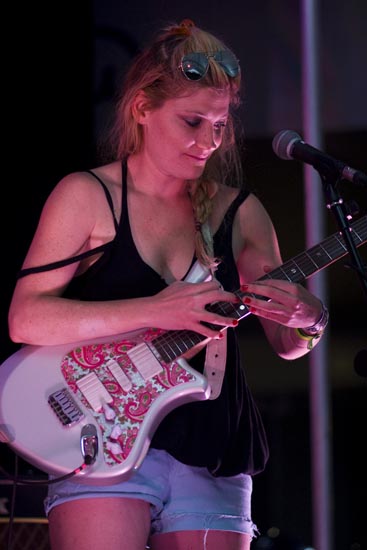Via a skype connection I can see Marnie Stern slurping some kind of frozen sugary Starbucks confection out of the frame (the green straw was evidence of her much documented caffeine addiction), the desk where she sits for “thousands of hours”, recording her intense, thick-knitted guitar parts, and the sofa where she knits, and pets her dog, Fig. Most importantly, I can see Marnie herself – blonde hair, constantly raised eyebrows and wide grin – to whom many more people will be privy on the release of her third, most engrossingly personal album to date.
Unlike In Advance Of The Broken Arm and This Is It And I Am It And You Are It And So Is That And He Is It And She Is It And It Is It And That Is That, Marnie Stern, unsurprisingly, deals with the fractious contents of Marnie’s head. Her first two albums were full of psychotically jagged, crazy cheer-leading songs and motivational chants. On ‘Steely’, from the obnoxiously titled album, she sings, “I’m like a raging animation”. Now, she’s attempted to siphon some of her torrid emotions into songs. It’s been a tough year for her – a chap she loved for eight years (she dated him for the first two of those) committed suicide. The loss provoked Marnie to write ‘For Ash’ and ‘Cinco De Mayo’ over a near-solid three day period. Then, finally loved up with Women’s Matthew Flegel, she wrote the last song on the record, ‘The Things You Notice’, about how much she loved him. Then they broke up.
All that heartbreak made for a much more personal record than her first two outings, but in a sense, bringing herself to the fore was also a rejection of the “virtuoso” tag that’s stamped upon her due to her dazzling finger tapping skills. We know that Marnie Stern can shred like a motherfucker – a fact that’s come to define Stern because shredding’s apparently not a typical ladylike pursuit – but we don’t know a great deal about her. Even a few weeks ago, when she made a negative comment about Best Coast’s lyrical simplicities in an interview that also covered profoundly sad emotional depths, that was all anyone wanted to talk about, attempting to pit girl against girl for some kind of grim #teammarnie vs #teambeth Twitter fight. Obvious rants about the sexist bent of that aside, it’s a shame, mostly because Stern’s a thoroughly interesting, infectious lady with a very familiar obsessive streak and a thing or three to say about lo-fi…
That must have been a shit week of interviews after <a href="
http://www.imposemagazine.com/features/marnie-stern" target="out">the Best Coast quote blew up, being asked about her all the time.
Marnie Stern: Well… yeah. That was such a strange thing. It wasn’t really part of the interview. We talked for such a long time and it was such a tiny little snippet. Also, stuff was cut out. It was edited differently.
They made it look as though you just jumped in and said that about her.
MS: No. No. I didn’t bring it up. She had been talking about it, then we were talking about it. Y’know, the strange thing is – the interview, I didn’t realize that it’d just be a transcript, Q/A/Q/A. But I said plenty of stuff about what I like and what I don’t like before, and nothing ever happened like that, ever. Nobody ever cares what I say! I feel badly about it, I don’t want to hurt anyone’s feelings. Gosh. But, y’know, at the same time, it’s like you’re not allowed to have an opinion about what you like and don’t like.
I think it got reported on so much because people wanted some horrible girl feud to start. The New York Times magazine, which really should know better, basically said that you said that about her because she’s a girl so she should be representing girls better, not just singing about girly shit.
MS: That’s even worse! Even more aggravating! The reason that that’s… well it’s obvious… agh! That’s so aggravating!
If it’d been two guys, they would not have turned it into that…
MS: Can you imagine if a guy said something about another guy and they were like, “See, you’re not supportive of other men!” What?! [giggles loads] So that’s crazy too. I was just talking about me, my tastes, what I am listening to right now, what helps me write music. I didn’t mean it to sound like a general statement, that there was anything wrong with it at all. Everyone has different tastes, and that helps shape them into whatever they’re going to do. Whatever they’re creating. It’s so silly to even have to explain it. You like some things, you don’t like others. It doesn’t mean there’s anything wrong with the others, it just means you have an opinion.
One of the commenters said something like, it’s such a shame she has to be so negative when she could be supporting an all-female band like Grass Widow from her label. For. Fuck’s. sake.
MS: AGH! Exactly! Exactly, exactly, exactly. Ugh. It’s really frustrating. I’ve said a million times, I really don’t separate male from female ever with music, I really don’t. It had nothing to do with her being a girl. If Wavves had come up, I would have said the same thing. It’s the style, not the gender.
That’s the more interesting point that that interviewer should have picked up on – you’ve mentioned how you’re not into lo-fi before, and right now it feels like there’s such a massive glut of the stuff that all sounds the same…
MS: Exactly the same. There’s nothing wrong with any of it – it’s all decent, it’s just not my style, it’s not my taste – but it all sounds the same. All of it. When I go on and listen to the stuff on the websites, I can’t tell, it all sounds like the same band, like they should all be in one band together [giggling], a 2,000-person band collectively playing on stage together [giggling even more]. Yeah, I guess things go in phases. This is a phase, that style of music. But it is interesting to me that coming with that style of music, it would seem to me that everyone’s pretty happy and laid back, and that everything’s going pretty well for everyone. We must be living in two different worlds, because things are really not the best. At least, not over here right now, with the economy, and that mental Republican woman, Christine O’Donnell – things are insane here. But with everything, it’s the same kind of thing, the blogs and… things just float in and out and nothing seems to last. Everything’s so disposable… No-one has – see, I’m getting in trouble again here, I don’t mean no-one – it just seems a little bit, generally, like people… [pause]… people don’t seem to care about convictions any more. When I was a teenager, the deal was that, y’know, you had a band that you were really loyal towards, almost to a fault, and you stayed really loyal to that band. That was the whole thing, that was such a big deal.
One of the things with Best Coast and those kind of bands is that it seems like everyone’s really happy all the time, that some labels are so desperate to grab the youth market that all they’re willing to sign is music that sounds chirpy and youthful…
MS: Yeah, yeah, yeah. But also, the other interesting thing is that because that type of music is really popular, I’ve never been on tour more…the other bands are getting younger and younger in age, because, if you haven’t really had to spend a lot of time playing or practicing, then you’ve got your band and then you’re on tour, so it’s really interesting how young the kids are – 20, 22. And I think, at that age, I would possibly be writing the same kind of stuff… How much life experience… I don’t know. Then there’s always that other side, music is a young thing, so that makes sense too.
You didn’t release your debut album until you were 30, right?
MS: I got the record the record deal when I was 30, and I put the record out just before I turned 31.
Had you self-released much before then?
MS: Yeah, but… I mean I’d make my CDs and do artwork and sell them at shows and stuff, and I did that for like… five years of playing around before anything happened. But I’m really lucky… In one case really lucky. I sent my demo into a label. At that point in time, that never happened. At that point in time, that never happened – because of MySpace – so I was really lucky to have that. On one hand, I feel irresponsible for bitching about people who have it real easy and don’t really have to seemingly work real hard at it to become successful, but at the same time, I don’t think I’d have a record deal, because I don’t go out or hang out or have friends who are cool or whatever. I mean, my friends are cool…!

Are you still on Kill Rock Stars? Over here the record’s out on Souterrain Transmissions…
MS: Yeah, yeah. That’s the label there that’s putting it out. But yeah, still on Kill Rock Stars for the US release. And I’m excited about this one, but it is a little harder, because it is kind of a sadder, more emotional record, so it’s a little bit embarrassing… to…know that people know everything that’s going on with my life, kind of, sort of, but yeah, I feel proud and good that I just put it all out there.
That struck me about the interview with the Best Coast comment – it was one of the most intense, emotionally intelligent (if that doesn’t sound wanky) interviews I’d ever read, and then everyone picked up on the money quote…
MS: I know! In the interview, I went on to say who am I to judge, blah blah blah, things I really believe, but that didn’t get added to the thing. It’s very frustrating. But nobody cares. Or a very small percentage of people care, and everyone else enjoys the outer bullshit and that’s why these bands are popular in the first place. I never think about what you just said – you’re right, the labels want to capture a certain market of kids and blah blah blah, and it’s true, I just never think about that stuff. It’s all part of a chain that’s moving along, but this phase of music has to switch.
It has to reach saturation point.
MS: Someone was saying to me recently that because of these bands now, kids younger than them are going to have a rebellion. Let’s get badass again! Yeah… I don’t know…
What you were saying about you not having an image is really interesting. With Best Coast, there’s this cute little story about the cat, weed and her boyfriend, but before this record, no-one’s ever really tried to get to know you – you got labelled as a “virtuouso” who shreds and taps a lot, and that’s where it ends.
MS: And I think because people put me in the shredder category, and I’ve said this so many times, but I can’t reiterate how true it is – there are so many good guitarists out there, I am by no means a very good guitar player. But what I’ve noticed, at least for me, is that I haven’t really… for my profile or what my press people call it, it’s much higher than the people that actually listen to the music. On MySpace I barely get hits at all. People… I don’t know, it’s part of the image thing, but it’s also the music itself, not falling into any one pocket, and… it stinks, because now I think everyone wants to just hear it, get it, know it, like it, as opposed to maybe being a little bit more confused, or just… I don’t even know. I thought that this record was as straight pop… I think, I think, half the songs are, to me, as straight ahead as you could go. And yet everyone is still “crazy!” “non-stop!”, and Zach [Hill] and I just shake our heads like, what? What?! We don’t get it.
You said in earlier interviews about this record that you did have a self-conscious artistic shift, and it definitely seems that specifically in certain songs, there’s much thicker carpets of finger tapping, so it doesn’t seem as much about technique. Your voice is much higher in the mix, so I wondered if part of the artistic decision was to tone down, or muddle in, the virtuoso aspect so that people had to address you as a person more. Not just as some crazy guitar lady doing freaky cheerleading.
MS: The interesting thing is, on the other albums, not the first one because that one’s bonkers, but on the last one, there are a couple of songs where the songs underneath really are the same, but the guitar is just in your face so much that it’s hard to pay attention to it. So with this, I kind of fell into it by accident, where I was getting really sick of the same kind of sound of the tapping line, so I added another layer of reverb, and all of a sudden it was sounding orchestral to me, and I liked it. That was the first idea. So that was one, blanketing, and then to fit the feel, then all the other guitar parts I had had to become a little less shrill. Vocals, the only reason the vocals are higher is because it’s really hard to mix. When you’ve got insane drums and a lot of guitar, it’s really hard to mix the vocals, to mix it all well, so we had this good mixer this time that just figured out the levels, and that’s also part of it, yeah.
With the time signatures, before there were parts so crazy that I couldn’t tell you what time signature they were in, and I still can’t, but here, it seems blockier, rather than all on top of each other. I’m really glad we’re doing this with video so I can make weird hand gestures at you…
MS: Ha! When we were in Sacramento recording this last one, Zach and I jammed for a little bit, so I said, “ok, play me this part that you’ve been working on,” a drum part. He started playing, and fuck. He does a part that every time it comes back around, changes to a new place. I was like, this is impossible. I can’t find 1. Where is 1? He was like, well it keeps shifting. No shit. And Matt was there, from Women, because he played bass, and we were both like, oh my god. So part of the last record was like, woah can you hear this, it’s shifting, and woooaaaah! But now, playing in different time to me is so natural that the parts that were coming up, it wasn’t a conscious like, I’m going to make this deliberately in 3/4, it just was the part, and then I just kept it throughout the whole thing instead of shifting it around. But then the last song on the record, that’s in 5/8, and I like that one because it doesn’t feel like it. It feels pretty straight and regular.
Where did you record this album? Are you still recording on Pro Tools and that at home?
MS: Wanna see?
Ooh ok!
MS: [takes the computer inside and points it at a desk with a laptop on it] So I just sit here and do it all. I send it to Zach and he puts the drums over it, then we go back to California and do the guitar and vocals over it. But the last song, I was going out with Matt, and a couple months ago, when we had already recorded it, I said, oh I want this to go on the record, and the mixer just mixed it, but it was just what we had recorded in here.

Did you write most of the record quite a long time ago?
MS: Yeah, I’d say that four of the songs were written two years ago, right after the last record came out, and then I’ve been in a major rut. Let me think… I wrote the Matt song just a couple months ago – the last one – and ‘Cinco de Mayo’ and ‘For Ash’, those two songs I wrote in May 2009. So… a while ago. ‘Build Her Confidence’, that one I did in Florida in January, so they were all spread out. Yeah. And now I’ve just been trying to figure out… I can’t, from sitting there all the time I fall into the pockets of figuring out what I’m going to try and move towards. That blanket of sound came by accident, and then I embraced it. Then I’d been sitting there for a year, trying to find the next and it’s just not coming. And it’s so incredibly frustrating…
Are you too harsh on yourself?
MS: I think I’m not harsh enough, honestly. When I hear the great classic rock songs that I want to write, I mean… I don’t just mean Bowie songs or Bruce Springsteen songs, songs that are just …‘Leila’, or songs that are… gawwwd, great songs! Then I think, my god, I’m mortified that I’ve sat at that chair for thousands of hours. For the amount of time I put in, I feel like I should be able to do that by now. I don’t know. It’s also… working from formula doesn’t work for me. I’ll try and recreate – ok, the ‘For Ash’ song, I really like that song, so then when I sat down I was trying to do the same kind of thing, that formula, like ok, I’ll put a tapping part, then a reverb part, but then it just doesn’t work. I found the other one by accident. It has to be that way, and – this isn’t me being hard – it just doesn’t sound good. It sounds like a copy. It just doesn’t sound genuine enough. And not interesting enough at all.
‘For Ash’ was written during a really intense three days – it must be incredibly hard trying to recreate something like that.
MS: Yeah, and the reason I could last for that long a period of being up was because the piece accidentally caught the excitement and adrenaline from, "Ooh this sounds different from usual… Ooh I like that…" That was the energy that kept me up. I wasn’t just sitting there and trying to work something out. I went to Florida in like, October, November, and Matt and I went to Calgary, we were here and then Calgary and then Florida and then he went back, and I was there for two months, sat outside on my mom’s patio, and trying to come up with stuff. Every night I would send him stuff, and I just couldn’t come up with anything. I guess that’s part of it. And the most frustrating thing is that I kept sending him stuff every day, and he was like yeah! But I was like, this sounds to you like the other stuff? What the hell?! But he would send me bare Women stuff too, and I’d be like, great great! And he’d do the same thing. So it’s all the person’s perspective, I think, of what you’re trying to feel when you hear it I guess.
What was going on during the three days in which you wrote ‘For Ash’? Were you up for that entire time?
MS: Um… I maybe slept for like four or five hours in between. No, I remember those three days. They were constant, sitting at the computer for like ten hours, then that little beginning part caught on, and I was like, ok I have to sing now, and I got the way I was going to sing, but not the words. But I was so in the mode that I was in the shower, so I got in the shower, and I’m trying to do the words, then I got out of the shower, naked, with a pen, wrote some more, got back in the shower, then got out, sat back down and did it. Everything blended into itself. Now the moment’s past, maybe it sounds trite or something, but I remember being so sad about him being gone, and crying as I was doing it, and feeling like I wanted to be able to do more, more, more for him, even though it was probably selfishly for me that I wrote it. But yeah, and the ‘Cinco De Mayo’ song too, same thing, it was just really intense and… Usually when I’m feeling that much I can’t make stuff. I don’t know – he had been in my mind for eight years, and for six of the years we didn’t even speak, but I thought about him every day. It was just so crazy that I was able to do it.
Do you think it’ll be hard playing this record out live, considering what much of it is about?
MS: Oh, I was thinking that – since Matt and I broke up, and that last song is about him, and written as a love song to him – “I love you, I love you” – so for the first couple months after the breakup, I thought, well there’s no way in hell I’m going to play that song live. But since then, I’ve become nostalgic for periods of my life, and now that it’s been a bunch of months since we split up, it’s nice to be in that song and remember the time, because I was happy in that time. Since life is so exhaustingly difficult, it’s nice to have just two minutes just to remember that nice time.
I totally know what you mean.
MS: Some people seem so different, some people feel so much more than other people, some people are able to push past things so much easier. And…it’s just fascinating to me. I feel like people are actually just built differently, have different chemicals going on in their goddamn brain, because… Well, no, that’s not true. If you have very few experiences in your life, romantically, or whatever you’re doing, then of course you’re going to talk about those, because there were only a few of them – as opposed to the people who repeat patterns, always at the bar, always with someone, always blah blah blah. With people like that, I see how it’s much easier to move on because we’re very able to get connected to things. And in music, you meet tons of people like that – I don’t even mean romantically, just in general – where it feels like they’re using the music as an escapism of life to avoid shit and while it makes total sense, it doesn’t seem entirely…not fulfilling, but…if you don’t really feel things through completely, I don’t know how you can really be happy. I’m only talking about me from my brain, I don’t know what it’s like to be in someone else’s head, but for me, the reason that I’m talking about this is that it goes toward a bigger end to me, of being human and… and making human connections to people as friends, and in all ways. And I feel like people who are guarded and shut off, I feel like they should have to wear a button that says, “shut down”, “guarded” or something.
“Don’t even try!”
MS: [cackles really hard] Jeez, yeah yeah! Because I guess also, the more I realise, the point of life for me is just to make connections with people and share experiences with people. It seems to me, that’s the only thing that ends up being really fulfilling or satisfying – your career, that’s important, and it helps you with your confidence I guess I’ve spent a decade in this bedroom, so many years just holed up in this room… Did you read this book called ‘Into The Wild’?
Yeah.
MS: And this guy goes into nature to live off nature, blah blah blah, I mean I read it ten years ago, or longer. But at the end, the idea he came back with was that he wanted to be with people, to be around people, and I guess you need balances in life. I’m sure that it’s not good not to be around people. I just think I have to work towards some kind of balance, but I don’t know how that would affect everything else in life.
Are you quite insular?
MS: Yeah, I never go out, ever. And I think that’s why I’ve been craving human connection so badly, and in a way, I’m excited to go on tour to be around people all the time. I keep doing this thing, looking back at the last six months and thinking what would I do differently, what would I tell myself, and it would be to be around people more. And also not to worry so much about everything, but it’s just so hard not to do that, y’know?
Deserts crop up in the lyrics quite a lot. Was that a particular thing?
MS: Yeah because I was…at some point I was in the desert and then you know its such a crazy feeling when you’re driving in California in the desert and it’s hot and it’s tense and then the person I had in mind with those songs went to go record their record in the desert and so it was kind of a reference to that. And I think Zach’s dad … we went to go have Margaritas one time, one night years ago and Zach’s dad was like: ‘yeah I’ll tear that desert up’ and I said that’s a good lyric.
There was something I was going to say earlier. I guess when, although you weren’t necessarily making music, when you were like 17 and 18 and stuff, you just, I guess the internet wasn’t around in the way that it is now.
MS: It had just come out but it wasn’t useful, you know, at all. So when I first started finding bands there was just like a music guide and you’d say I like Sleater-Kinney, and then it would connect you to the homepage. It was all about digging it out yourself and finding it. It wasn’t easy for indie rock. So with Pitchfork, I think that’s why that was so helpful. You know, it could direct you to bands that people weren’t listening to in the mainstream but I did so much digging
I would find the label and then all the stuff they’ve put out. I dunno if that’s what kids nowadays would do that, or have to do that even anymore.
That’s what Hype Machine does for everyone. It goes around the internet and collects everything.
MS: And because music wasn’t free yet, they wouldn’t really offer MP3s so you had to buy things to see if you liked it or not. Which is crazy if you think about how much music you bought and then didn’t even like the stuff. It was a different world where bands made money off their music.
I find it really surprising reading interviews with you where you said that you have no money and you have to try and find the money to tour and stuff…
MS: When you’re a solo artist and you have a band on tour you have to pay the band some salary. You don’t realise the expenses, the way they add up SO quickly. But thank god I’m not a money person. So it doesn’t really bug me at all, I mean it’s more comical to me… But I mean I, compared to my friends it is a little bit embarrassing, but um, but it just is what it is. I don’t know about other bands, in, like in Canada you get grants, like a lot of grants.
[Skype problems kill the interview, we give up and talk about shit lo-fi bands, dogs and knitting.]




